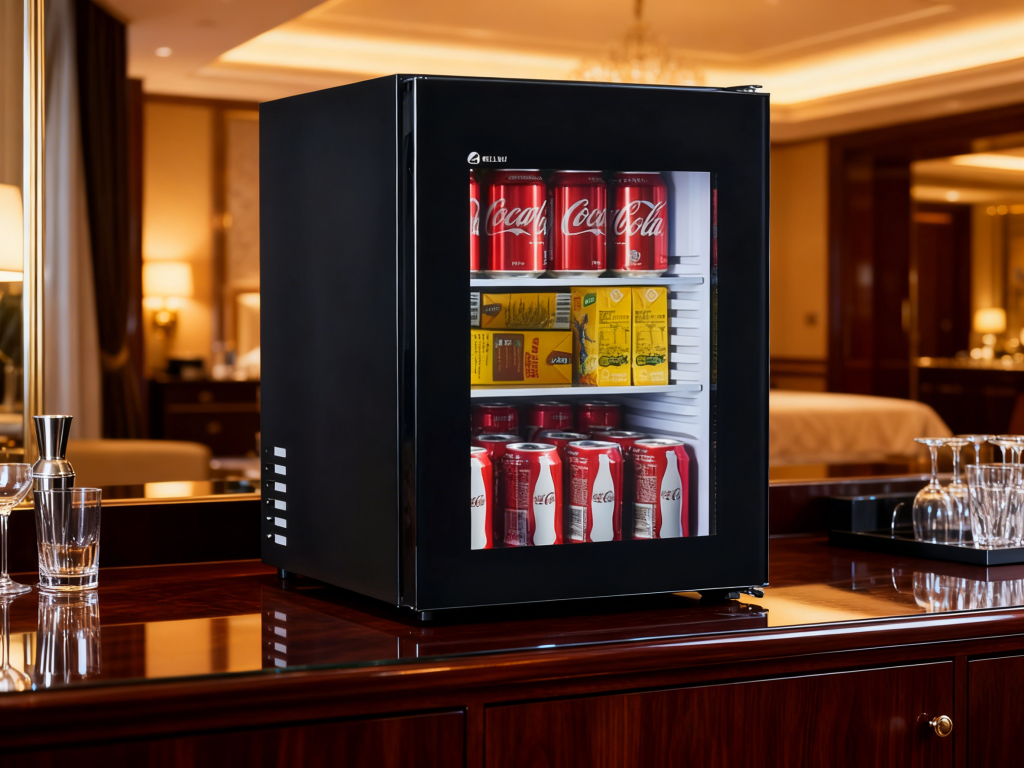When designing modern hospitality spaces, residential projects, or commercial interiors, every element contributes to the overall style and atmosphere. While refrigerators are typically seen as purely functional appliances, the glass-door refrigerator has become a premium design feature that enhances both aesthetics and user experience. For designers seeking elegant, space-efficient, and visually appealing solutions, a glass-door mini bar or compact fridge offers surprising advantages.
Below, we explore the key aesthetic benefits designers can gain by choosing a refrigerator with a glass door, especially in hotel rooms, guest suites, lounges, and small living spaces.

One of the standout aesthetic features of a glass-door refrigerator is its transparency. Instead of hiding what’s inside, the clear door turns the refrigerator into a clean, modern display. When stocked neatly with beverages, snacks, or curated items, the interior becomes part of the room’s visual composition.
Glass doors made with tempered, high-transparency materials blend smoothly with contemporary interiors. They add reflective depth without overwhelming the space, making them ideal for rooms that follow minimalist, luxury, or boutique-style design themes.
For designers working with compact areas such as hotel rooms, studio apartments, or office suites, a glass-door refrigerator can subtly enhance the sense of openness. Because guests or residents can see inside without opening the door, the appliance feels lighter and less bulky compared to traditional solid-door models.
This transparency reduces visual barriers, allowing the space to feel more welcoming and less cluttered. In hospitality settings, where compact layouts are common, this effect remarkably improves design flow and room comfort.
A well-designed space should look good and function efficiently. Glass-door refrigerators provide both benefits. Many modern models operate with low noise, making them perfect for quiet environments such as hotels and guest rooms. Silent or near-silent refrigeration systems ensure that the appliance contributes to comfort rather than disturbing it.
Premium construction, such as multi-layer tempered glass, insulated door panels, and energy-efficient cooling systems, ensures long-term performance. Designers can integrate these units confidently, knowing that the product will maintain its aesthetic integrity and durability through continuous use.
A visible interior is not only visually appealing but also convenient. Guests can instantly see what is available without needing to open the door repeatedly. This small advantage enhances user experience, reduces temperature fluctuations, and improves energy efficiency.
For hotels, this transparency increases the perceived value of room amenities. A neatly bright refrigerator acts as a subtle luxury touch, signaling quality and attention to detail — features guests often remember and appreciate.
Another aesthetic advantage of glass-door refrigerators is their versatility. Many models offer a range of capacities, door frame styles, internal shelving layouts, and lighting options. Designers can select sizes appropriate for different room types — from compact mini bars to medium-capacity hotel refrigerators.
Interior LED lighting, metal or glass shelves, and frameless or metal-trimmed doors allow designers to match the refrigerator to the room’s existing materials and color palette. In upscale environments, this alignment enhances harmony and reinforces the overall design identity.
Sustainable design is becoming increasingly important in modern projects. Glass-door refrigerators naturally support energy-efficient behavior because users can see inside without opening the door. Less frequent opening means lower energy consumption, reduced temperature loss, and more stable performance from the cooling system.
For eco-focused hospitality or residential projects, this aligns with green building principles and demonstrates a thoughtful approach to appliance selection.
To maximize the visual and functional impact of a glass-door fridge, designers can follow a few best practices:
A refrigerator with a glass door is far more than a functional appliance — it is a design asset. Its transparency, modern styling, and ability to enhance spatial perception make it an excellent choice for hotel rooms, residential interiors, and commercial spaces. Combined with energy efficiency, quiet operation, and flexible design options, it delivers both visual appeal and functional value.
For designers seeking elegant, contemporary solutions that enhance guest or user experience, the glass-door refrigerator is a refined and impactful choice that complements today’s design trends.
Recent postsLearn More